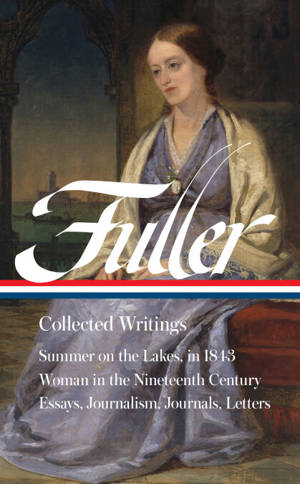
Bedankt voor het vertrouwen het afgelopen jaar! Om jou te bedanken bieden we GRATIS verzending (in België) aan op alles gedurende de hele maand januari.
- Afhalen na 1 uur in een winkel met voorraad
- In januari gratis thuislevering in België
- Ruim aanbod met 7 miljoen producten
Bedankt voor het vertrouwen het afgelopen jaar! Om jou te bedanken bieden we GRATIS verzending (in België) aan op alles gedurende de hele maand januari.
- Afhalen na 1 uur in een winkel met voorraad
- In januari gratis thuislevering in België
- Ruim aanbod met 7 miljoen producten
Zoeken
€ 44,36
+ 44 punten
Uitvoering
Omschrijving
“Humanity can be divided into three classes: men, women, and Margaret Fuller.”—Edgar Allan Poe
A true American original—radical transcendentalist, intrepid journalist, and pioneering feminist—joins Library of America with the most authoritative single-volume collection of her writings ever, including many rare and previously unpublished works, newly transcribed from original notebooks and journals
Transcendentalist, journalist, feminist, activist, public intellectual, war correspondent, poet: Margaret Fuller’s achievement in her short life was as diverse, wide-ranging, and radical as her multi-generic writings. Now, at long last, this pioneering writer joins Library of America with the most comprehensive and most authoritative version of her writings ever published.
Here are her two best-known books: Summer on the Lakes, in 1843, an account of her travels to the Great Lakes, a plea for better treatment of the American Indian peoples, and a sketchbook of Fuller’s thought; and Woman in the Nineteenth Century, the foundational document of American feminism and the first major work on women’s rights since Wollstonecraft’s A Vindication of the Rights of Woman fifty-three years earlier.
Joining them are a generous selection of Fuller’s published essays and journalism, including “American Literature” and her reviews and columns for the New York Tribune, as well as her war correspondence from besieged Rome in 1849; unpublished writings and selections from Fuller’s journals, many previously unknown and newly transcribed for this volume; and a selection of Fuller’s letters, including three newly translated from the original Italian.
Rounding out the volume are a chronology by Fuller’s biographer Megan Marshall, along with helpful notes identifying Fuller’s many allusions and quotations, and an index.
A true American original—radical transcendentalist, intrepid journalist, and pioneering feminist—joins Library of America with the most authoritative single-volume collection of her writings ever, including many rare and previously unpublished works, newly transcribed from original notebooks and journals
Transcendentalist, journalist, feminist, activist, public intellectual, war correspondent, poet: Margaret Fuller’s achievement in her short life was as diverse, wide-ranging, and radical as her multi-generic writings. Now, at long last, this pioneering writer joins Library of America with the most comprehensive and most authoritative version of her writings ever published.
Here are her two best-known books: Summer on the Lakes, in 1843, an account of her travels to the Great Lakes, a plea for better treatment of the American Indian peoples, and a sketchbook of Fuller’s thought; and Woman in the Nineteenth Century, the foundational document of American feminism and the first major work on women’s rights since Wollstonecraft’s A Vindication of the Rights of Woman fifty-three years earlier.
Joining them are a generous selection of Fuller’s published essays and journalism, including “American Literature” and her reviews and columns for the New York Tribune, as well as her war correspondence from besieged Rome in 1849; unpublished writings and selections from Fuller’s journals, many previously unknown and newly transcribed for this volume; and a selection of Fuller’s letters, including three newly translated from the original Italian.
Rounding out the volume are a chronology by Fuller’s biographer Megan Marshall, along with helpful notes identifying Fuller’s many allusions and quotations, and an index.
Specificaties
Betrokkenen
- Auteur(s):
- Uitgeverij:
Inhoud
- Aantal bladzijden:
- 850
- Taal:
- Engels
Eigenschappen
- Productcode (EAN):
- 9781598538045
- Verschijningsdatum:
- 24/02/2025
- Uitvoering:
- E-book
- Beveiligd met:
- Adobe DRM
- Formaat:
- ePub

Alleen bij Standaard Boekhandel
+ 44 punten op je klantenkaart van Standaard Boekhandel
Beoordelingen
We publiceren alleen reviews die voldoen aan de voorwaarden voor reviews. Bekijk onze voorwaarden voor reviews.









